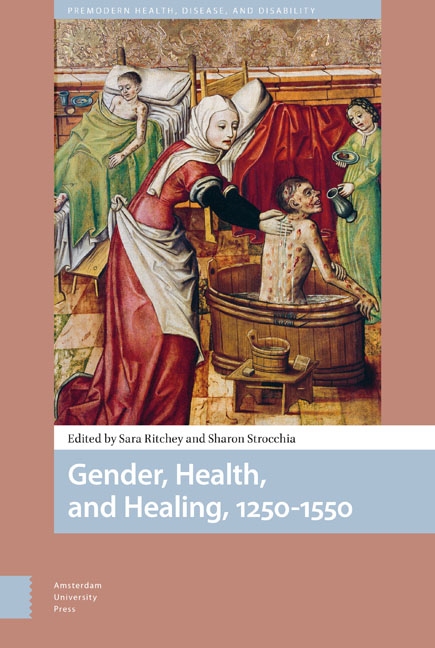Book contents
- Frontmatter
- Contents
- List of Figures and Tables
- Acknowledgments
- Abbreviations
- Introduction: Gendering Medieval Health and Healing: New Sources, New Perspectives
- Part 1 Sources of Religious Healing
- 1 Caring by the Hours: The Psalter as a Gendered Healthcare Technology
- 2 Female Saints as Agents of Female Healing: Gendered Practices and Patronage in the Cult of St. Cunigunde
- Part 2 Producing and Transmitting Medical Knowledge
- 3 Blood, Milk, and Breastbleeding: The Humoral Economy of Women's Bodies in Medieval Medicine
- 4 Care of the Breast in the Late Middle Ages: The Tractatus de passionibus mamillarum
- 5 Household Medicine for a Renaissance Court: Caterina Sforza's Ricettario Reconsidered
- 6 Understanding/Controlling the Female Body in Ten Recipes: Print and the Dissemination of Medical Knowledge about Women in the Early Sixteenth Century
- Part 3 Infirmity and Care
- 7 Ubi non est mulier, ingemiscit egens?: Gendered Perceptions of Care from the Thirteenth to Sixteenth Centuries
- 8 Domestic Care in the Sixteenth Century: Expectations, Experiences, and Practices from a Gendered Perspective
- 9 Bathtubs as a Healing Approach in Fifteenth-Century Ottoman Medicine
- Part 4 (In)fertility and Reproduction
- 10 Gender, Old Age, and the Infertile Body in Medieval Medicine
- 11 Gender Segregation and the Possibility of Arabo-Galenic Gynecological Practice in the Medieval Islamic World
- Afterword: Healing Women and Women Healers
- Contributors
- Index
10 - Gender, Old Age, and the Infertile Body in Medieval Medicine
Published online by Cambridge University Press: 23 June 2021
- Frontmatter
- Contents
- List of Figures and Tables
- Acknowledgments
- Abbreviations
- Introduction: Gendering Medieval Health and Healing: New Sources, New Perspectives
- Part 1 Sources of Religious Healing
- 1 Caring by the Hours: The Psalter as a Gendered Healthcare Technology
- 2 Female Saints as Agents of Female Healing: Gendered Practices and Patronage in the Cult of St. Cunigunde
- Part 2 Producing and Transmitting Medical Knowledge
- 3 Blood, Milk, and Breastbleeding: The Humoral Economy of Women's Bodies in Medieval Medicine
- 4 Care of the Breast in the Late Middle Ages: The Tractatus de passionibus mamillarum
- 5 Household Medicine for a Renaissance Court: Caterina Sforza's Ricettario Reconsidered
- 6 Understanding/Controlling the Female Body in Ten Recipes: Print and the Dissemination of Medical Knowledge about Women in the Early Sixteenth Century
- Part 3 Infirmity and Care
- 7 Ubi non est mulier, ingemiscit egens?: Gendered Perceptions of Care from the Thirteenth to Sixteenth Centuries
- 8 Domestic Care in the Sixteenth Century: Expectations, Experiences, and Practices from a Gendered Perspective
- 9 Bathtubs as a Healing Approach in Fifteenth-Century Ottoman Medicine
- Part 4 (In)fertility and Reproduction
- 10 Gender, Old Age, and the Infertile Body in Medieval Medicine
- 11 Gender Segregation and the Possibility of Arabo-Galenic Gynecological Practice in the Medieval Islamic World
- Afterword: Healing Women and Women Healers
- Contributors
- Index
Summary
Abstract
Medieval medical texts regularly discussed a range of reproductive disorders in men and women. As part of this discussion, they often noted that men and women were infertile in extreme youth and old age. Although medieval medical views of infertility have received scholarly attention, these references to age and infertility have not been analysed. This chapter traces these references in a range of twelfth- to fifteenth-century Latin medical works. It argues that discussions of men and women's fertility in old age were broadly similar, and that age was more important than gender when medical writers thought about age-related infertility. Nonetheless, behind the similarities many medical writers presented age as placing a greater burden on women's fertility than men’s.
Keywords: fertility, aging, menopause, reproduction, women's medicine
Age has long been recognized in both medieval and modern medicine as one of the many factors that might delay or prevent the conception of a child. In modern culture the effects of age on fertility are often presented as an issue for women in particular. Since the 1970s, the image of the ‘biological clock’ and the dangers of ‘leaving it too late’ have centred on women, while contemporary media stories about older parents have also often focused on women having children in their forties or after the menopause. Medieval medical writers also noted the negative effects of old age on fertility but their approach to gender was rather different. While they generally paid special attention to women, their discussions also regularly included men in a way that might seem surprising to a modern reader.
This topic has received relatively little discussion from medievalists. There is a growing body of work on aging and old age in the Middle Ages, but it often says comparatively little about fertility, instead focusing on the question of when one was considered ‘old’ (variable, but often around the age of 60) and on life for those aged 60 and over, including examinations of retirement, disability, and impairment. Meanwhile, the essays collected in Sue Niebrzydowski's edited volume on middle-aged women focus primarily on issues other than fertility.
- Type
- Chapter
- Information
- Gender, Health, and Healing, 1250–1550 , pp. 267 - 290Publisher: Amsterdam University PressPrint publication year: 2020



